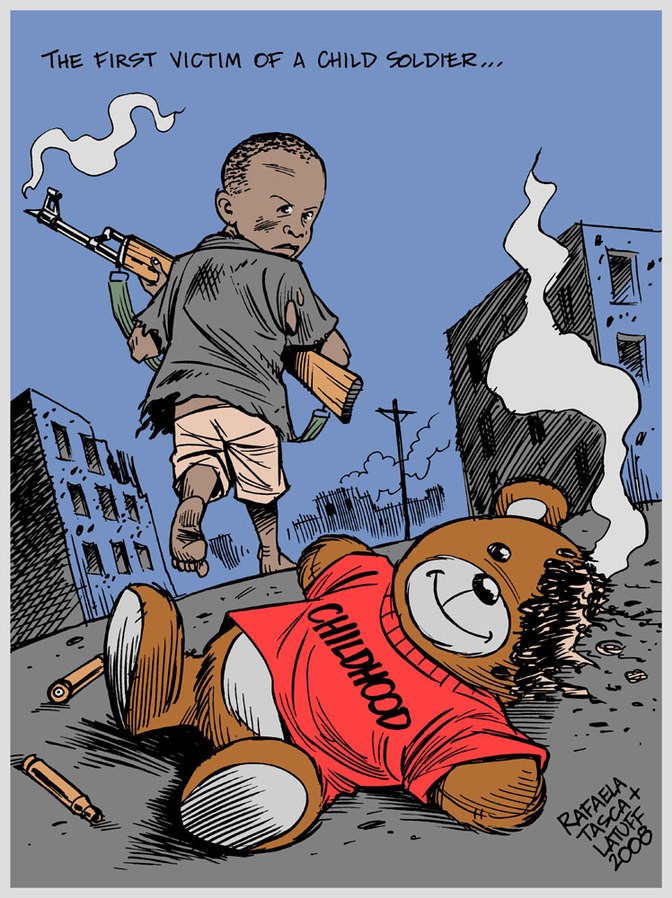Ban Child Soldiers

Image courtesy of Rafaela Tasca and Carlos Latuff is unmodified and licensed under the Free Art License.
Senga was orphaned at age 5 after the Rwanda genocide. A man offered him an opportunity to fight with rebel forces and then find a good job. Instead, he fought as a child soldier for 10 years. “I was promised a job but ended up on the battlefield,” he recounted to the United Nations.
The use of child soldiers is illegal under international law, but many states and non-state armed groups continue to recruit children.
The Child Soldiers Prevention Act (CSPA), signed into law in 2008, criminalizes the use of child soldiers by governments. But most recruitment happens at the hands of independent militia groups.
The US should make it a crime to sell weapons to groups who use child soldiers.
Actions
1. Email your federal lawmakers today.
Ask your U.S. Senators and Representative to strengthen the CSPA.
Email your U.S. Senators:
- Find your U.S. Senators here.
- Use or modify our email template to send to your federal lawmakers.
Email your U.S. Representative:
- Find your U.S. Representative here.
- Use or modify our email template to send to your federal lawmakers.
Learn more
Child soldiers are both boys and girls under the age of 18 used for various military purposes. Some are used for fighting; others are used as cooks, messengers, spies, or informants; girls are often used as sexual slaves and objects. It is illegal under international law, but many states and non-state armed groups continue to recruit children.
There are tens of thousands of child soldiers used in armed conflicts around the world.
Military organizations target children because they are easier to entice or force into service than adults. They are also more compliant and easier to manipulate.
Some children join military organizations to escape poverty, for protection, or because they lack other opportunities. Others are recruited after being separated from their families during armed conflict.
The Child Soldiers Prevention Act (CPSA)
The Child Soldiers Prevention Act was signed into U.S. law in 2008. It requires the Secretary of State to identify countries that have governmental armed forces or government-supported armed groups that recruit and use child soldiers. The CSPA requires the Secretary of State to publish a list of those countries in the annual Trafficking in Persons (TIP) report. The governments of CSPA-listed countries may not receive certain forms of U.S. military assistance. The President may waive these restrictions in full or in part, if it is determined to be in the national interest of the United States.
Which countries use child soldiers?
The 2021 TIP report named governments in 15 countries that are involved in the use of child soldiers.
- Afghanistan
- Myanmar
- Democratic Republic of the Congo
- Iran
- Iraq
- Libya
- Mali
- Nigeria
- Pakistan
- Somalia
- South Sudan
- Syria
- Turkey
- Venezuela
- Yemen
Which countries’ restrictions were waived?
In 2020, the President granted waivers to several countries on the above list, including Afghanistan, Iraq, Libya, Nigeria, the Democratic Republic of Congo, Somalia, South Sudan, and Yemen. This allowed for various forms of assistance, including military and peacekeeping assistance in some cases.
The president has not yet granted waivers to countries listed in the 2021 TIP report.
Why waive?
Waivers can be used as a strategic and diplomatic tool. According to the U.S. State Department, countries receive full or partial waivers if certain restrictions would harm the national interests of the US or put a humanitarian strain on vulnerable communities in the country. Often, the US provides waivers so it can offer security assistance, work with foreign militaries, promote reforms, and increase respect for democratic values.
Partial waivers are often granted to reward countries that have taken significant steps to eliminate the recruitment and use of child soldiers. For example, the Democratic Republic of Congo was granted a partial waiver after it signed and took steps to implement a joint action plan with the United Nations to eliminate the use of child soldiers. Similarly, Rwanda was granted a partial waiver after it terminated support of M23, an armed group that used child soldiers.
Criticism of waivers
Activists maintain that unconditional military aid sends a message that the US knowingly supports countries’ use of child soldiers.
The Obama administration was criticized for granting waivers that authorized nearly $1 billion in military assistance and arms sales for countries using child soldiers and withholding only $35 million – 4% of what was sanctionable under law – between 2010 and 2015.
The Trump administration was criticized for granting waivers that allowed more than $115 million in military assistance to perpetrators. Additionally, the exclusion of Saudi Arabia from the TIP report came under fire as reports showed that children as young as 14 were fighting on behalf of Saudi Arabia in Yemen.
Updated September 2023.


